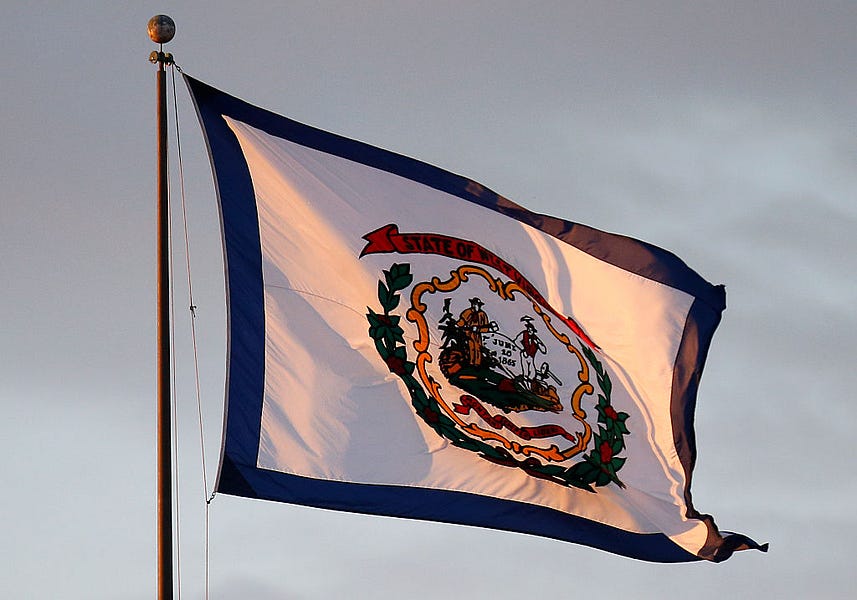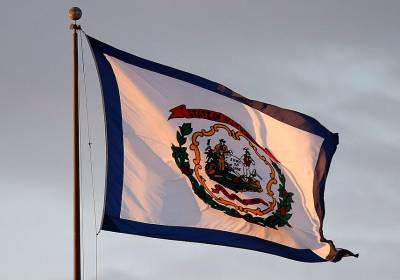We have talked a great deal about the first federal observance of Juneteenth, and rightly so. There is much to grieve in the story of black Americans, and Martin Luther King Jr. Day, an honor for a martyr, is an appropriately somber occasion. But we must also always rejoice in our triumphs, and the destruction of slavery here is a triumph insufficiently celebrated.
“He has sounded forth the trumpet that shall never call retreat,” so the song goes. “Oh, be swift, my soul, to answer Him! Be jubilant, my feet!”
But you probably did not notice the weekend’s other triumphal holiday from the Civil War, unless you happen to be one of us lucky sons or daughters of the Mountain State. Sunday was West Virginia Day, the celebration of the 158th anniversary of the creation of the state, a living testament to liberty.
Its creation was, ahem, a little shady. Even the state’s great benefactor, Abraham Lincoln, could only summon this weak defense: The division of a State is dreaded as a precedent. But a measure made expedient by a war, is no precedent for times of peace. It is said the admission of West Virginia is secession, and tolerated only because it is our secession. Well, if we can call it by that name, there is still difference enough between secession against the Constitution, and secession in favor of the Constitution.
The Great Emancipator, paragon of the Founders’ vision, defender of the Constitution, lo, unto his death, could basically come up with “Yeah, and so’s your sister…” to defend granting West Virginia its statehood. Plain Virginia, as my children obligingly call it, had the better legal case to make for reunification after the war was over. And by this week in 1863, Americans were coming around to the idea that the war was going to be over and in the Union’s favor … probably.
The previous year was the closest the United States has ever been to the end. In 1862, Gen. Robert E. Lee and his forces had run circles around Gen. George McClellan. European powers, led by cotton-hungry Britain, might have forced a ceasefire that would leave America permanently divided and crippled. The country that 78 years later would answer to Winston Churchill’s plea, “the New World, with all its power and might, [will step] forth to the rescue and the liberation of the old,” was very nearly done in by American slavers boosted by British textile barons.
But, by this week in 1863, troops under Gen. Ulysses Grant had besieged the last Confederate stronghold on the Mississippi River at Vicksburg. Even better, Lincoln had in the spring evicted notable twerp and soon-to-be Democratic presidential nominee McClellan from command of the Army. Ominously for the South, the Battle of Antietam had shown that the slaughter of the war would be industrial in scale. The rebels could not match the ingenuity and productivity of the North. So, while the Confederate defeat at Gettysburg was still a week away, plans for life after the war were taking shape.
This is why West Virginia Day remains a big deal for the small population of the 35th state. The Constitution holds that no state can be divided by the federal government. Kentucky, Maine, and Vermont had all been part of other states, but their mother states had chosen separation and petitioned Washington. While the government in what was then Wheeling, Va., claimed to speak for the whole commonwealth—“the restored government of Virginia”—that was far from the truth. Richmond would not fall for nearly two years and the people on the eastern side of the mountains surely did not recognize a bunch of businessmen, abolitionists, German immigrants, and damnYankees 350 miles away as their legitimate government.
The western Virginians who broke away after the state joined the Confederacy two years prior had already provided most of the benefit they could to the federal cause. The Ohio River and rail lines to the west were secure and the foundries and factories along the river were churning out war materiel. The Confederates did not pose a significant threat west of the Allegheny Mountains even by the end of 1862, when the statehood bill had been presented to Lincoln. Certainly by the third summer of the war, it would have probably been better for Lincoln to maintain the status quo of the phony-baloney “restored government.”
The Radical Republicans in Congress had been pressing him hard for West Virginia statehood among other demands. Caving on a question of constitutional propriety did not appeal to Lincoln. It also could complicate his efforts to bring Virginia back. “Doubtless those in remaining Virginia would return to the Union, so to speak, less reluctantly without the division of the old state than with it,” he wrote. But West Virginians had “been true to the Union under very severe trials.” “We have so acted as to justify their hopes;” he wrote, “and we cannot fully retain their confidence, and co-operation, if we seem to break faith with them.” West Virginia had earned its place, the 35th star on the flag and the only state born of the Civil War.
Today is a state holiday and celebrations will take place across West Virginia’s 55 counties. That’s a lot of terrain. West Virginia stretches as far to the east as the suburbs of Washington, D.C., and as far to the west as Detroit. Her southern tip is below Richmond, Va., but she goes as far north as New York City. In all that space, there are just 1.8 million souls, about the same number as in the city of Phoenix. And today, they will proudly wave the state flag, at the center of which are three important reminders. The date of our statehood, the Phrygian or “liberty” cap that is the symbol of freed slaves, and our motto: Montani semper liberi, “Mountaineers are always free.”
So, if you want to keep going with the Juneteenth celebration of the defeat of slavery and the new birth of freedom, toast your friends in West Virginia today. (Moonshine is strictly optional.)







Please note that we at The Dispatch hold ourselves, our work, and our commenters to a higher standard than other places on the internet. We welcome comments that foster genuine debate or discussion—including comments critical of us or our work—but responses that include ad hominem attacks on fellow Dispatch members or are intended to stoke fear and anger may be moderated.
With your membership, you only have the ability to comment on The Morning Dispatch articles. Consider upgrading to join the conversation everywhere.